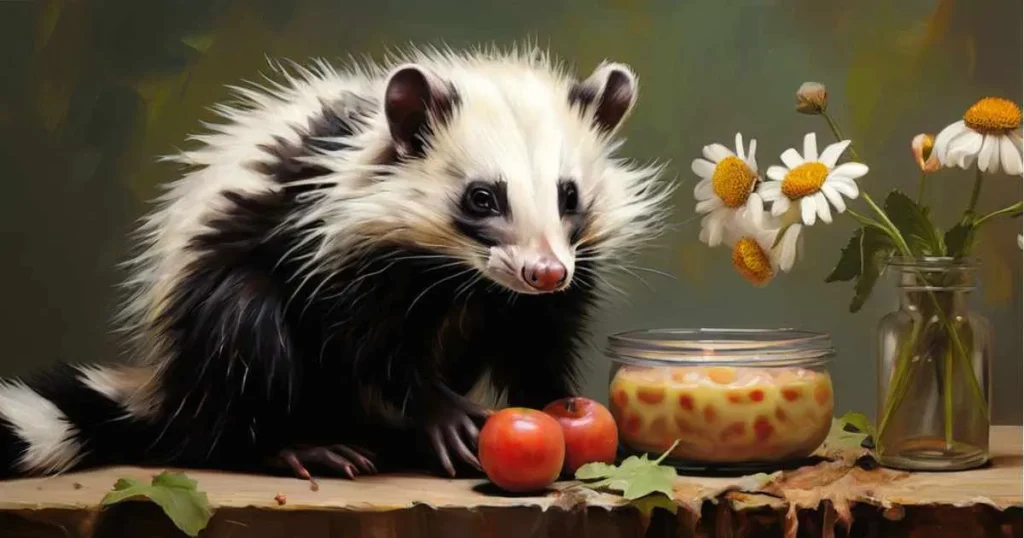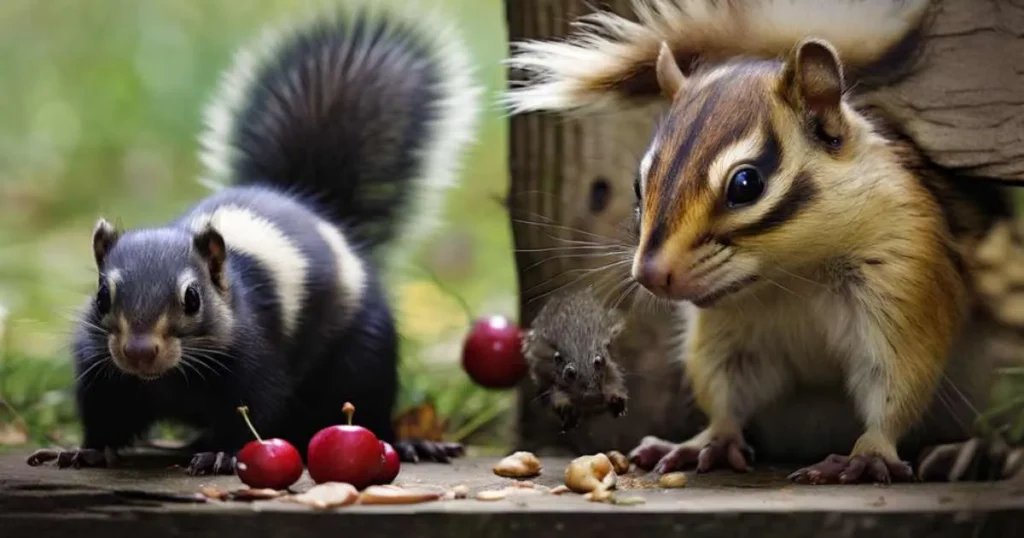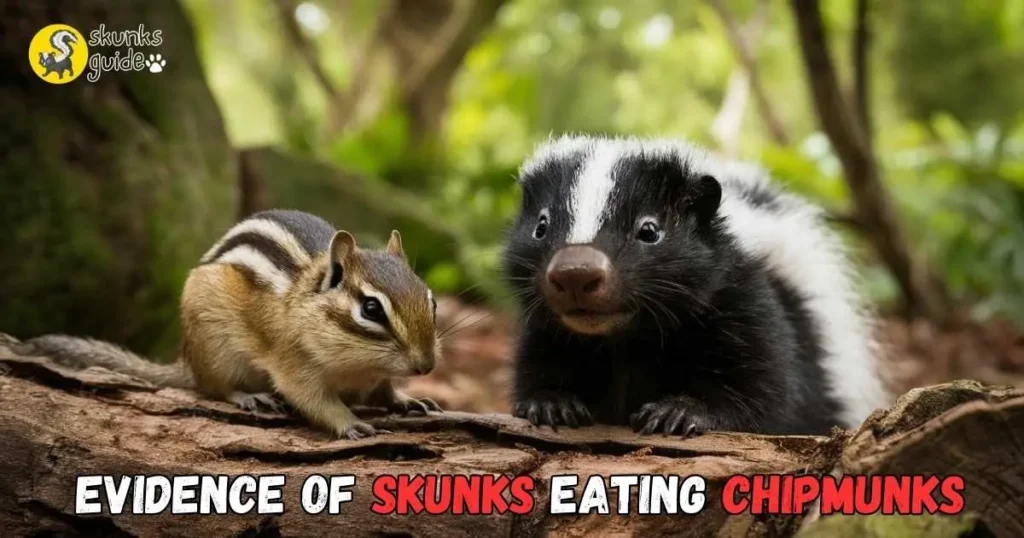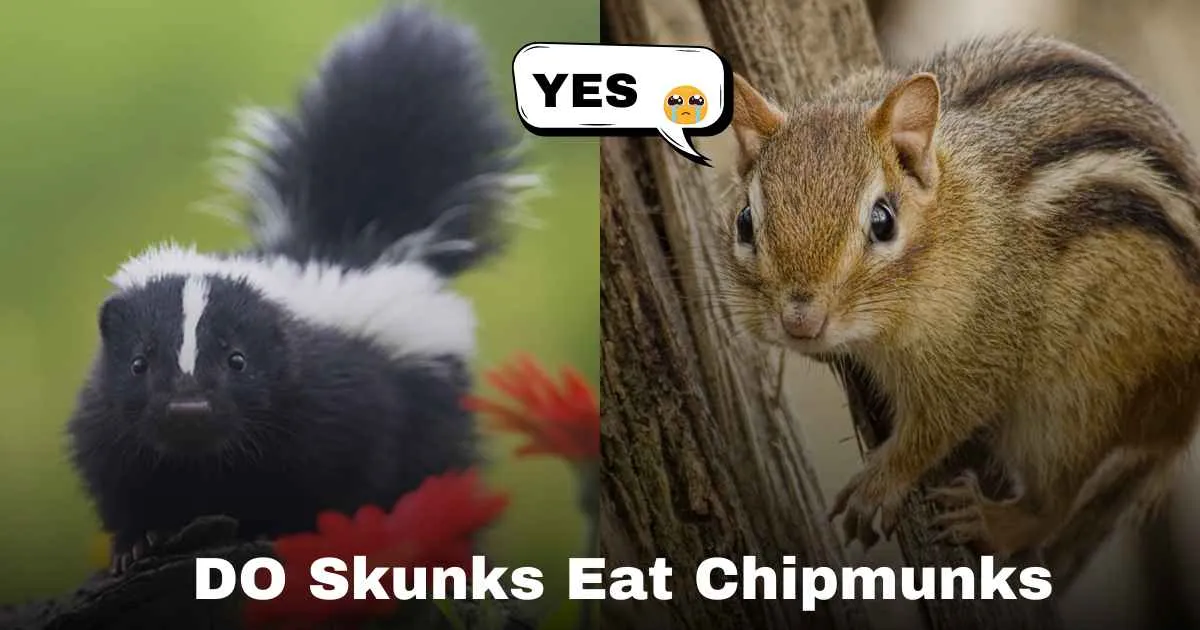Can Skunks Safely Eat Chipmunks? Surprising Facts
Last updated on December 7th, 2024 at 07:44 am
Skunks are often recognized by their black-and-white fur and infamous defensive spray, but their dietary habits and interactions with other small mammals, such as chipmunks, can be equally intriguing. While skunks are not expert hunters of chipmunks, they are opportunistic feeders that may occasionally include these nimble rodents in their varied diet.
Skunks’ Dietary Habits
Omnivorous Nature:
Skunks are omnivores, meaning their meals come from both plant and animal sources. Insects, grubs, fruits, berries, nuts, and small vertebrates all feature in their diet. This flexibility allows skunks to thrive in diverse habitats and seasons, adjusting their food intake based on availability.
Seasonal Changes:
- Spring and Summer: Insects and small mammals are abundant. Skunks feed heavily on beetles, larvae, and sometimes rodents.
- Fall: Fruits, nuts, and seeds gain prominence as skunks prepare for leaner times.
- Winter: Activity slows; skunks may rely on stored fat, occasional prey, or carrion if accessible.
Skunks and Chipmunks
Opportunistic Predation:
While skunks typically focus on insects and easy-to-catch prey, they won’t pass up a protein-rich meal if the opportunity arises. Chipmunks, being small rodents, offer valuable nutrients. However, chipmunks are fast, wary, and diurnal, whereas skunks are nocturnal. This difference in activity periods reduces encounters.
Prey Preference:
Chipmunks are not a primary food source for skunks. Insects and grubs are easier to catch, and plant matter is readily available. Still, if a skunk stumbles upon a vulnerable or injured chipmunk, it may seize the chance.ize the chance.

Interactions in Shared Habitats
Shared Environments, Different Timings:
Skunks and chipmunks often inhabit similar areas—forest edges, grasslands, and even suburban yards. Yet, their schedules differ. Chipmunks are active during the day, gathering seeds and scurrying about in sunlight, while skunks emerge at dusk, relying on keen senses of smell and hearing to locate food. This temporal separation lowers the likelihood of frequent skunk-chipmunk predation.
Predator-Prey Dynamics:
If a skunk does prey on a chipmunk, it’s part of the natural predator-prey balance. Such events, though not common, help regulate small mammal populations and maintain ecological stability.
Evidence and Observations
Observational Studies:
Wildlife researchers and homeowners with trail cameras have occasionally noted skunks with small rodent prey. While direct evidence of chipmunk predation may be scarce, reports and camera footage suggest it can happen.
Prey Diversity:
Skunks have been documented consuming mice, voles, and eggs. Including a chipmunk in their diet is simply another instance of their opportunistic feeding strategy.s into the nature of these interactions and evaluates the diet of skunks in relation to chipmunks.

Wildlife Management and Conservation
Respecting Natural Behaviors:
Skunks’ occasional predation on chipmunks is a natural occurrence. Conservation efforts focus on maintaining healthy habitats that allow all wildlife to fulfill their ecological roles. Understanding these dynamics guides responsible wildlife management.
Monitoring Populations:
Wildlife professionals track species numbers to ensure no imbalances occur. Knowing that skunks are not heavily reliant on chipmunks for food can calm concerns about overpredation.compelling indicators suggesting that these striped nocturnal creatures might indeed consider chipmunks as part of their diet.

Observational StuFrequently Asked Questions
Do skunks prefer chipmunks over other prey?
No. Skunks are opportunistic feeders, mainly consuming insects, fruits, and small rodents when easily caught. Chipmunks are not a primary target.
What attracts skunks to yards?
Easily accessible food sources—unsecured garbage, pet food, grubs in the lawn—can draw skunks near human dwellings.
Are skunks beneficial to humans?
Yes. By eating insects and rodents, skunks help control pests. Their presence can be a sign of a healthy, balanced ecosystem.
Conclusion
While skunks can and occasionally do eat chipmunks, such predation is neither common nor a primary aspect of their diet. Instead, their omnivorous nature and opportunistic feeding habits allow them to adapt to various conditions, ensuring survival across different habitats and seasons. Understanding this nuanced relationship between skunks and chipmunks highlights the intricate balance of nature’s food web and encourages appreciation for the roles each species plays.

